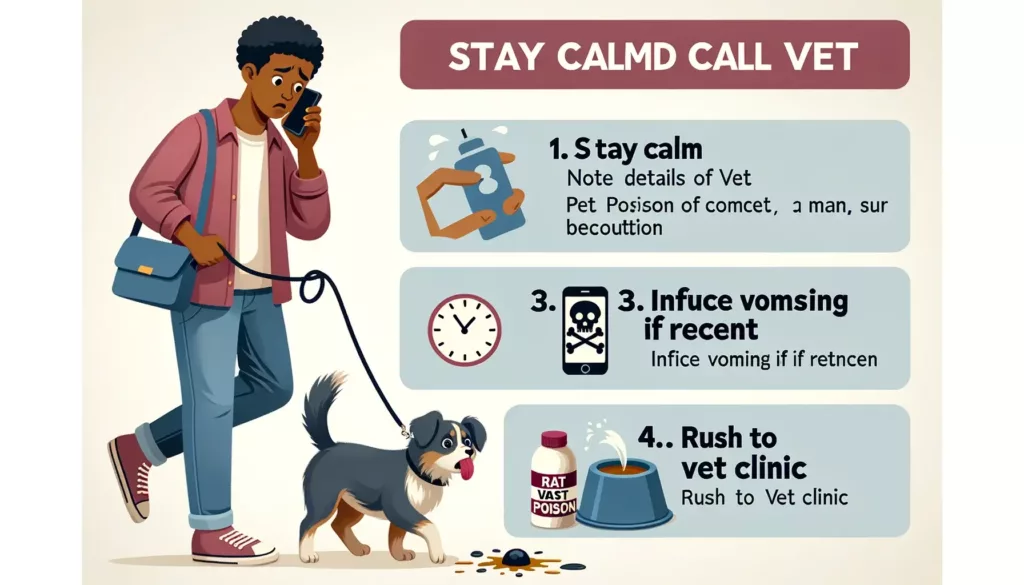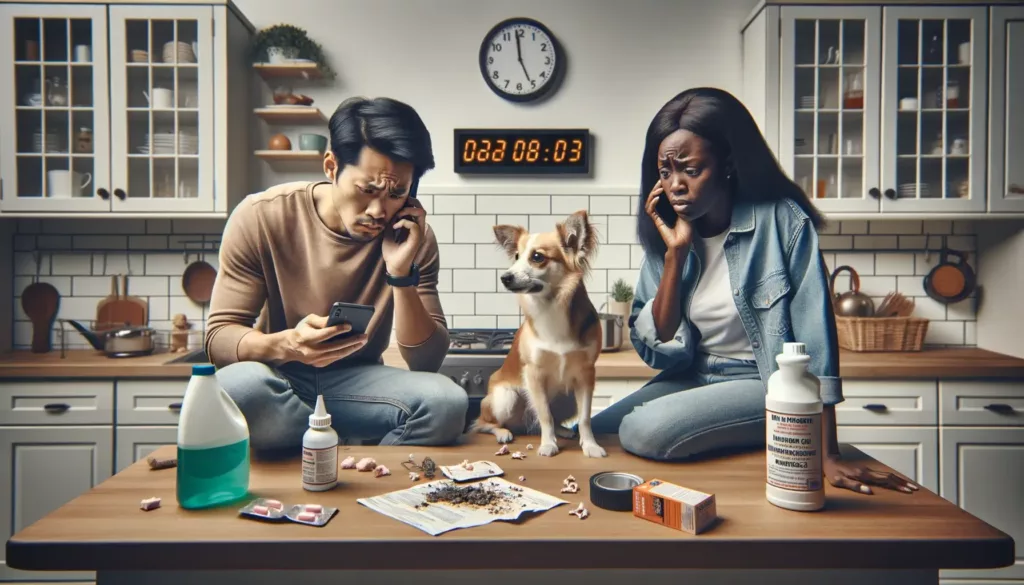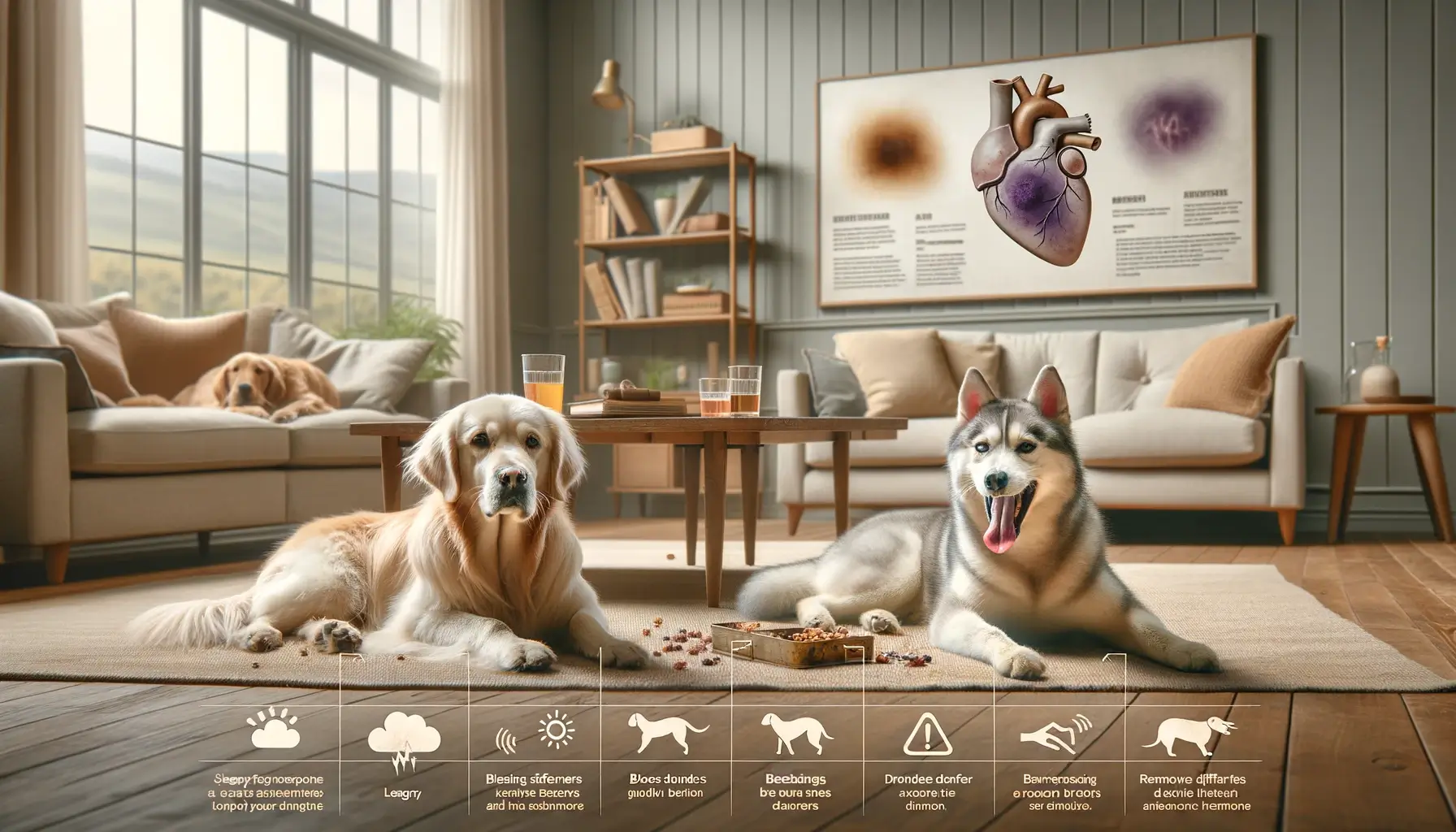| If Your Dog Eats Rat Poison, Do This Immediately: |
|---|
| Stay calm but call your vet or poison control right away |
| Provide details on timing and amount ingested |
| Induce vomiting if ingestion was recent |
| Get to an emergency vet clinic for treatment |
| Ongoing monitoring and blood tests are critical |
Rat poison is one of the most common causes of pet poisonings each year. If you suspect your dog has ingested any form of rodenticide, immediate action is critical. This guide will cover the types of rat poisons, symptoms of poisoning, what to do if your dog eats rat poison, and how vets treat it.
Types of Rat Poison and Their Dangers
There are several categories of toxic rodenticides that can harm dogs:
Anticoagulants
These are the most common type of rat poisons, making up over 90% of all rodenticide poisonings. They prevent blood from clotting normally, leading to uncontrolled internal and external bleeding. Warfarin, brodifacoum, and bromadiolone are some of the most toxic anticoagulants that can be devastating if a dog ingests them. Even small amounts can be critical. Anticoagulant poisoning should be treated as a life-threatening emergency requiring prompt veterinary care to prevent shock, catastrophic bleeds or death.

Neurotoxins
Neurotoxic poisons attack the nervous system and brain, causing neurological symptoms. Chlorophacinone and zinc phosphide are common examples. They can result in seizures, tremors, ataxia, respiratory failure and extreme agitation in poisoned dogs. Neurotoxic rodenticides are intensely potent and toxic for dogs, with just a small amount resulting in severe, life-threatening reactions requiring intensive hospitalization.
Calcium bombs
These rodenticides work by interfering with calcium regulation and releasing excessive calcium into the cells, leading to kidney failure, heart issues, and calcification of organs. Cholecalciferol-based poisons like Quintox fall into this category. They quickly result in kidney dysfunction, vomiting, weakness, and multi-organ damage. Swift treatment is imperative.
| Types of Rat Poison | Mechanism of Action | Signs of Toxicity |
|---|---|---|
| Anticoagulants | Prevent blood clotting | Bleeding, bruising |
| Neurotoxins | Attack nervous system | Seizures, tremors |
| Calcium bombs | Elevate calcium levels | Kidney failure |
All types are highly toxic and life-threatening without treatment. Fortunately, with rapid decontamination and veterinary care, many dogs fully recover if poisoning is caught early.
Signs and Symptoms of Rat Poisoning in Dogs
Symptoms of rat poison toxicity depend on the type of rodenticide. They can appear within a few hours of ingestion or take 2-3 days to show up as toxins get absorbed. This makes ongoing monitoring after potential exposure very important.
Some common signs of anticoagulant poisoning include lethargy, weakness, trouble breathing, and collapse. As internal bleeding develops, dogs may cough up or vomit blood, bleed from the nose and gums, experience bruising, have bloody urine or stool, and show evidence of internal hemorrhage.
With neurotoxic poisons, dogs may develop sudden, uncontrolled tremors or seizures. They may act anxious, vocalize excessively, and become sensitive to noise and touch. Extreme lethargy, agitation, trouble walking and respiratory distress are other neurotoxin poisoning symptoms.
For calcium bombs, vomiting, loss of appetite, increased thirst and urination signal developing kidney issues. Weakness, hypercalcemia, muscle tremors and abdominal pain are other signs.
In severe cases of any rodenticide poisoning, dogs can experience catastrophic internal bleeding, heart failure, severe organ damage, blood clots, coma and even death without emergency treatment.
| Signs of Rat Poisoning | Description |
|---|---|
| Lethargy/weakness | Lack of energy, inability to move normally |
| Labored breathing | Rapid, difficulty, respiratory distress |
| Bleeding disorders | Bruising, bloody urine or stool, nosebleeds |
| Appetite/digestive issues | Loss of appetite, vomiting, diarrhea |
| Neurological symptoms | Tremors, seizures, agitation, sensitivity |
| Organ damage | Kidney, liver, heart failure; death |
The onset of symptoms can be delayed 2-3 days too as poisons get fully absorbed. This makes monitoring after potential exposure critical even if the dog seems normal at first.
What To Do If Your Dog Eats Rat Poison

If you have any suspicion your dog may have ingested rodenticide, stay calm but take immediate action. First, identify the poison if possible so you can provide specifics to your vet. Immediately call your veterinarian, emergency vet clinic, or Pet Poison Helpline hotline. Provide details about the timing of ingestion and amount eaten if known.
Per their guidance, induce vomiting at home using hydrogen peroxide if ingestion was within the last 2 hours. DO NOT induce vomiting if the dog is already showing signs of bleeding or bruising, only if advised by the vet. Otherwise, bundled up and head straight to the veterinary clinic or emergency room. Time is of the essence.
Treatment needs to begin ASAP and may include:
- Gastric decontamination or induced vomiting if very recent poisoning
- IV fluids and injectable antidotes
- Blood transfusions and vitamin K supplements
- Plasma, oxygen therapy, kidney dialysis
- Medications to prevent clotting and treat poisoning
The absolute best outcomes happen when treatment starts within 1-2 hours, before toxins get absorbed. But even if it has been a day or more, prompt vet care can still save a dog’s life. Follow all homecare instructions for medicine doses, rechecks, and monitoring.
How Vets Treat Rat Poisoning in Dogs
Veterinarians have an arsenal of treatments to combat rat poison toxicity. Exact protocols depend on the type and amount ingested, timing, and if organ damage has begun. But some common therapies include:
- IV fluids to maintain blood pressure, prevent dehydration and flush toxins from the body.
- Blood transfusions or plasma to replace blood cells and clotting factors lost from poisoning bleeds.
- Vitamin K is an essential antidote, given by injection and orally, to counteract anticoagulants.
- Oxygen therapy provided through an oxygen mask or tent if the dog is in respiratory distress.
- Medications like Vitamin K1, atropine, prothrombin complex concentrate, anti-seizure drugs, etc. to serve as antidotes.
- Kidney dialysis may be done for kidney failure from calcium-based poisons.
- Repeated blood cell counts and organ function tests to monitor conditions.
With aggressive therapy and 24/7 supportive hospital care, many dogs recover fully even from critical poisonings. But expect at least 3-5 days of intensive treatment.
Preventing Exposure to Rat Poisons
The best way to handle rat poisons is to avoid using them at all on your property if you have pets. There are safer pest control methods available today. But if you must use rodenticides:
- Keep all bait packs and boxes completely out of your dog’s reach and access, ideally in secured, locked containers.
- Read product labels carefully and only use brands designated “pet safe” that contain less toxic compounds if they will be accessible.
- When outdoors with your dog, watch them closely and don’t allow sniffing or licking around potential rodent burrows and bait stations outside. Keep dogs leashed and monitored.
- At home, have a licensed exterminator treat for pests rather than attempting do-it-yourself rat poisoning.
- Ensure children and house guests do not place these dangerous chemicals where pets can reach them.
Educate family members about the hazards and what emergency steps to take if poisoning ever occurs or is suspected. Post important phone numbers for your vet, poison control hotlines, and closest emergency animal hospital.
Long-Term Effects and Ongoing Monitoring
Even after treatment and apparent recovery, rat poison can cause hidden organ damage that may not manifest right away. Dogs may be at higher lifelong risk for recurrent bleeding or developing blood clots. Permanent liver, kidney or heart damage is possible.
Closely monitor your dog for several weeks after poisoning for delayed onset of symptoms. Routine blood tests are recommended to check for organ issues and blood cell counts. Your vet may prescribe ongoing vitamin K supplements or other medications for months afterwards.
Consider getting pet insurance to assist with coverage for future medical issues stemming from rat poison toxicity. Discuss the long-term prognosis and continued care recommendations with your veterinarian. Be vigilant for any recurring symptoms and follow up routinely.
FAQs About Dogs and Rat Poison
Can dogs die from eating rat poison?
Yes, absolutely. Rat poisons can rapidly be fatal without urgent veterinary treatment. However, with aggressive decontamination, antidotes and therapy initiated in the first 2-12 hours, many dogs recover fully if treated promptly. Still, these substances are highly toxic and every exposure should be treated as a medical emergency.
What does rat poison look like?
Rat poisons come in pellets, blocks, granules, bait packs, and liquid formulations. Color ranges from blue, green, yellow to pink. Packaging often lacks clear warning symbols. Assume anything unknown ingested could potentially be poisonous bait.
How much rat poison will kill a dog?
Even ingestion of a very small amount, such as licking trace residue off their paws or fur, can be lethal. Rat poisons are some of the most toxic substances to pets. Do not wait for symptoms to develop – get same-day veterinary help.
Are rats poisonous to dogs?
Rats themselves are not inherently poisonous to dogs. However, dogs can get extremely sick through secondary poisoning by eating a rat that has already ingested poison bait itself. This “bioaccumulation” results in the dog being exposed to even higher toxin levels.
Conclusion
If you even suspect your dog may have ingested rat poison, skip home remedies and go directly to your vet or emergency clinic immediately. Acting fast to get prompt veterinary treatment greatly improves the chances of survival and full recovery. Take stringent preventative steps to keep all rodenticides completely away from pets. With proper handling and common sense, tragic poisonings can be avoided. Your veterinarian is your partner in keeping your dog safe, healthy and protected from preventable environmental hazards like rat bait.
Hi, I’m John and I love dogs. Ever since I was a kid, I always wanted to have a furry friend by my side. I grew up with a golden retriever named Max, who taught me a lot about loyalty, friendship, and fun. He was my best buddy for 12 years, and I miss him every day.
